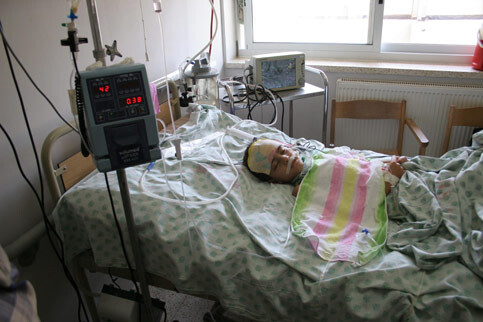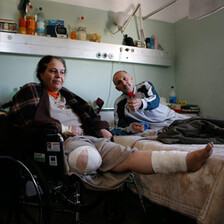Gaza Strip 21 November 2008

A Palestinian patient at the European hospital in the Gaza Strip, August 2007. (Hatem Omar/MaanImages)
Over the past two weeks, Palestinians in the Gaza Strip have faced a sharply deteriorating humanitarian situation as Israel further tightened its closure of the border crossings. Virtually no food, medicine or other vital supplies have been allowed in to the territory that is home to 1.5 million people. The impact of the siege is most directly observed in Gaza’s health sector. Despite desperately needed medication, equipment, supplies, and spare parts, doctors continue to try to save lives and look after their patients at the European Gaza Hospital, one of territory’s largest medical centers.
Dr. Zaki Azzaq Zouq, an oncologist, explained, “There is a widespread shortage of essential medicines which we used to give to patients prior to the blockade. Currently, there are no tools for physicians to treat patients who suffer from lung, stomach, colon or brain cancers.”
The situation is just as dire in Gaza’s other hospitals. Unable to get life-saving treatments close to home, Israel also prevents patients from Gaza leaving the tiny coastal territory to receive medical care. Nael Alfaqawi, 28, has kidney problems, but was denied entry to Israel so he could seek treatment abroad. Instead, he is now being treated at the Nasser Hospital in southern Gaza.
Mr. Alfaqawi said, “When I wanted to travel out of Gaza for treatment, the [Israeli] intelligence personnel asked me to collaborate with them, but I refused. They said, either you collaborate with us or you go back to Gaza. Of course, I refused to comply with them, saying I’m going to die sooner or later, so I returned home.”
An estimated 70 percent of the Gaza Strip has experienced lengthy power outages for the last two weeks as Israel has cut off fuel supplies to Gaza’s only power plant. Hospitals must rely on generators to keep life-saving equipment running.
“We are unable to ensure that we have needed spare parts to provide heating for patients,” said Nihad Swaty, head of the European Gaza Hospital’s maintenance department. “We also have our own sewage processing plant to provide water. The current lack of equipment will lead to the plant’s total collapse and consequently to an environmental crisis at the hospital itself,” he warned.
International agencies and officials, including UN Secretary General Ban Ki-moon have condemned the closure as a violation of international humanitarian law and called on Israel to lift the blockade. But there is no sign of relief. Israel has even blocked foreign journalists, who are usually based in Tel Aviv or Jerusalem, from entering the Gaza Strip.
Dr. Abdellatif Alhaj, director of the European Gaza Hospital, said “We continually send our appeals to international organizations such as the International Committee of the Red Cross, the World Health Organization and the United Nations. But unfortunately, it appears that the United Nations is facing a crisis itself, as it has started to warn that it will cut off services to residents. We are calling on the United Nations to help us, but it seems that this international organization is no longer able to bring in essential needs such as flour and rice.”
Dr. Alhaj said that spare parts for the hospital’s CT scanner — one of only two such vital devices in the entire Gaza Strip — had been held up by the Israelis for over five months.
Earlier this month John Ging, the Gaza director of UNRWA, the UN relief agency for Palestinian refugees, warned that “UNRWA is unable to deliver food in Gaza due to the strict Israeli blockade.”
Israel says the borders will remain closed until Palestinian resistance militias stop firing rockets at nearby Israeli towns. A ceasefire negotiated between Israel and Hamas, the ruling party in Gaza, has generally held since last June. It was broken on 4 November, according to the Palestinian Centre for Human Rights, when Israeli occupation forces invaded the central Gaza Strip and then killed six Palestinians in air attacks. Palestinian resistance groups retaliated for the killings by firing rockets into Israel.
In June 2007, Israel imposed a crippling blockade on Gaza after Hamas took over the interior of the territory amid violent clashes with US-backed militias loyal to Palestinian Authority President Mahmoud Abbas. Under the terms of the ceasefire, Israel was supposed to lift the Gaza blockade gradually, but it has never done so.
Rami Almeghari is contributor to The Electronic Intifada, IMEMC.org and Free Speech Radio News. Rami is also a former senior English translator at and editor-in-chief of the international press center of the Gaza-based Palestinian Information Service. He can be contacted at rami_almeghari A T hotmail D O T com.
Related Links





